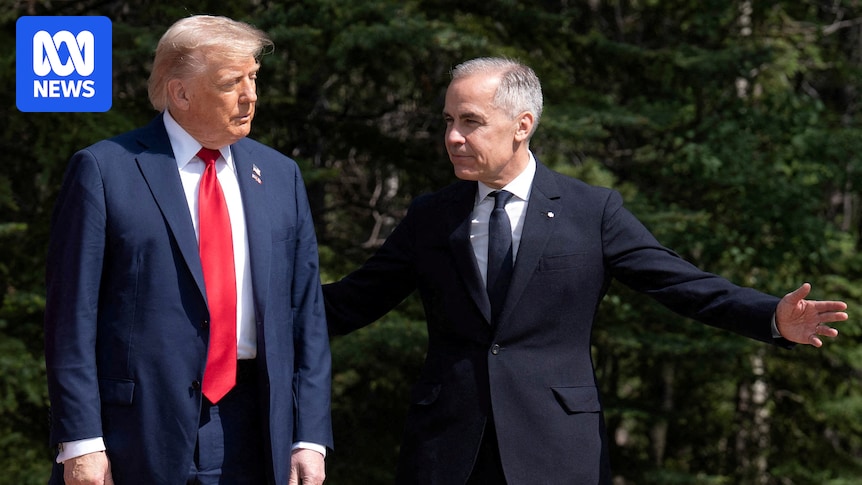
US President Donald Trump has abruptly ended trade negotiations with Canada, citing a new Canadian tax on US technology firms as a “blatant attack.” This unexpected move on Friday has thrown US-Canada relations into disarray, disrupting a period of relative stability following a cordial G7 meeting in June where Trump and Canadian Prime Minister Mark Carney had pledged to finalize a new economic agreement within 30 days.
The announcement comes just hours after US Treasury Secretary Scott Bessent expressed optimism about ongoing trade discussions, highlighting progress with China on critical mineral imports and other key tariff negotiations. The often unpredictable nature of Trump’s trade policies since his return to office has caused significant fluctuations in financial markets and has started to impact consumer spending, a crucial component of the US economy.
Impact on Financial Markets and Trade Relations
Despite the initial shock to US stocks, with a brief dip following Trump’s announcement, the S&P 500 and Nasdaq closed the week at record highs. Trump’s decision to set a new tariff rate for Canada comes as the country plans to implement a digital services tax on US technology firms, including Amazon, Meta, Alphabet’s Google, and Apple.
The tax, set at 3% of digital services revenue from Canadian users exceeding $20 million annually, will be retroactive to 2022. Trump, in a post on his Truth Social platform, described the tax as “a direct and blatant attack on our country,” and labeled Canada a “very difficult country to TRADE with.” He announced the termination of all trade discussions with Canada, effective immediately, and promised to reveal the new tariff rate within seven days.
Reactions and Future Implications
Speaking at the White House, Trump stated that negotiations with Canada would not resume until Canada “straightens out their act,” emphasizing the US’s leverage over its northern neighbor. Canada, the second-largest US trading partner after Mexico, purchased $349.4 billion of US goods last year and exported $412.7 billion to the US, according to US Census Bureau data.
In response, Prime Minister Carney’s office stated, “The Canadian government will continue to engage in these complex negotiations with the United States in the best interests of Canadian workers and businesses.” Meanwhile, Treasury Secretary Bessent attempted to downplay the dispute, suggesting that US Trade Representative Jamieson Greer might initiate a Section 301 probe into Canada’s digital tax, potentially leading to retaliatory tariffs equivalent to the estimated $2 billion impact on US firms.
“Based on this egregious Tax, we are hereby terminating ALL discussions on Trade with Canada, effective immediately,” Trump declared.
Broader Trade Negotiations and Global Context
Earlier on Friday, Bessent mentioned that the Trump administration’s various trade deals could be finalized by the September 1 Labor Day holiday. This includes ongoing talks with 18 top trade partners and a revised agreement with China to resume the flow of rare earth minerals and magnets. The administration has also sent a new proposal to the European Union, and India has dispatched a delegation to Washington for further discussions.
“So we have countries approaching us with very good deals,” Bessent said on Fox Business Network. “We have 18 important trading partners. … If we can ink 10 or 12 of the important 18, there are another important 20 relationships, then I think we could have trade wrapped up by Labor Day,” he added.
US and China confirm trade deal framework: China will approve export applications of controlled items in accordance with the law.
Resolution with China and Ongoing Negotiations
In a related development, Bessent announced that the US and China had resolved issues regarding the shipment of Chinese rare earth minerals and magnets to the US, modifying an agreement reached in May in Geneva. This resolution is crucial for industries reliant on these materials, including automakers, aerospace manufacturers, and semiconductor companies.
China’s Commerce Ministry confirmed the details of the framework for implementing the Geneva trade talks consensus, stating that it would approve export applications according to the law. As part of its retaliation against new US tariffs, China had previously halted exports of critical minerals, disrupting global supply chains.
The Trump administration also engaged in trade discussions with India and Japan, with the Japanese government affirming its commitment to reaching a mutually beneficial agreement. As these negotiations unfold, the global trade landscape remains in flux, with potential implications for international economic stability.





